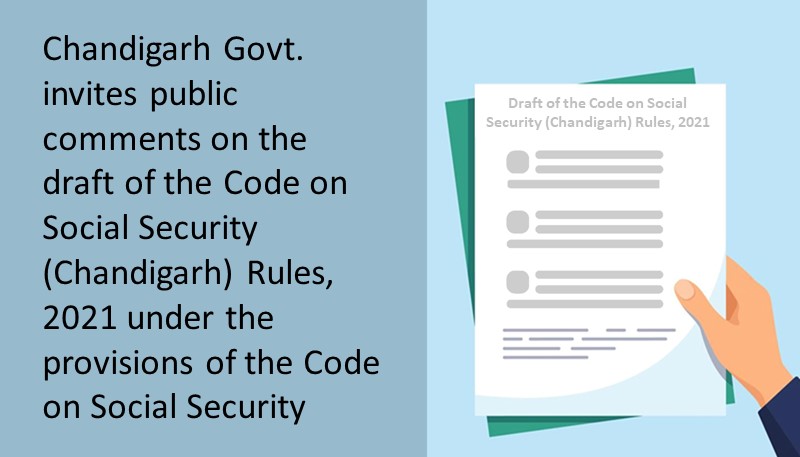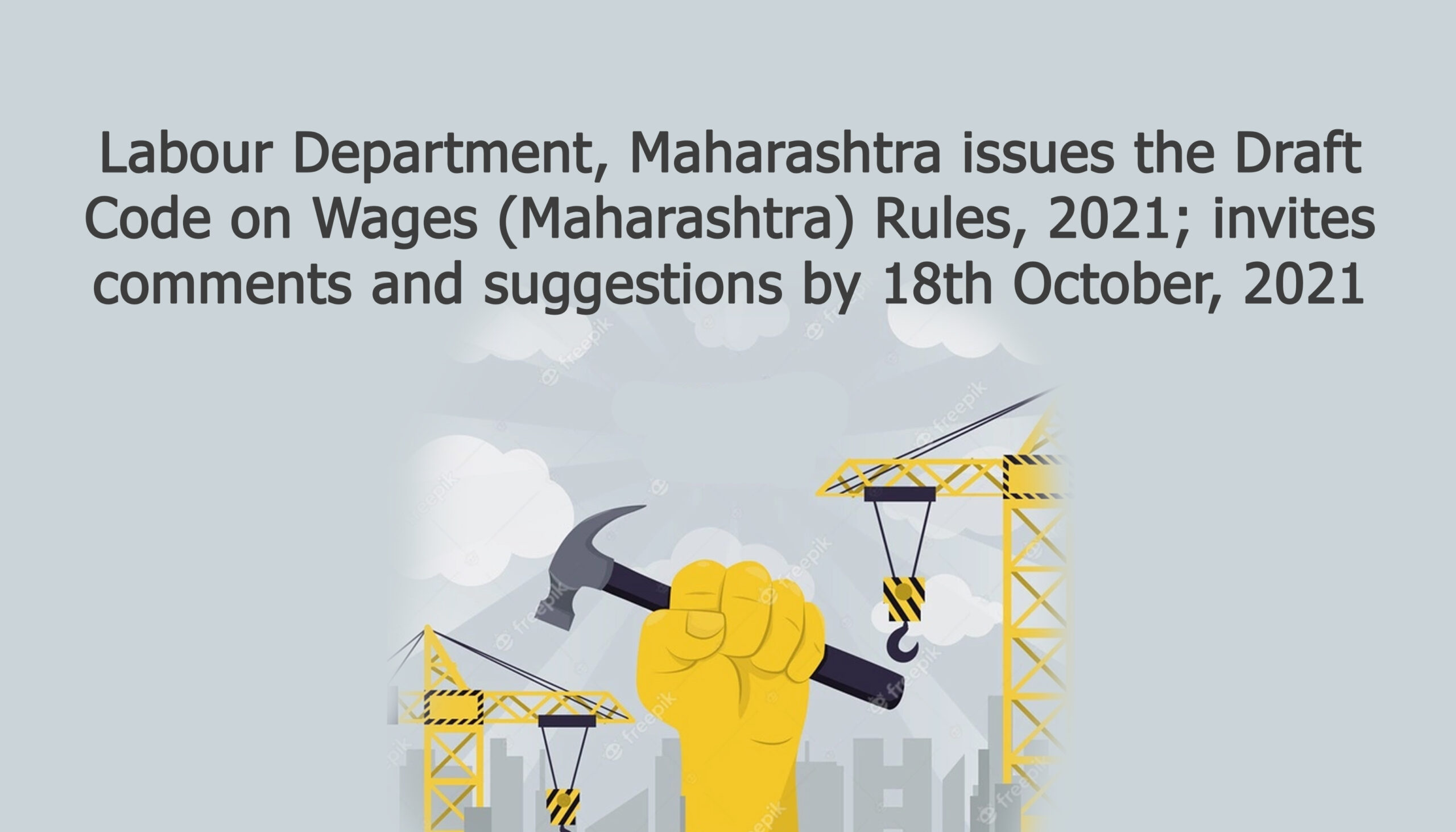The Government of Chandigarh has proposed the draft of the Code on Social Security (Chandigarh) Rules, 2021 (“Draft Rules”) under the provisions of the Code on Social Security, 2020 (Code). The Draft Rules propose to supersede the following:
- The Chandigarh Maternity Benefit Rules, 1974
- Payment of Gratuity (Chandigarh) Rules, 1972
- Chandigarh Building and Other Construction Workers (Regulation of Employment and Conditions of Service) Rules, 2008
- Chandigarh Unorganized Workers’ Social Security Rules, 2018
- Workman’s Compensation Rules, 1924
1. Gratuity:
Nomination:
- A nomination is required to be submitted by an *employee in Form IV (in duplicate) either by personal service (after taking proper receipt or by registered post acknowledgement due) or electronically to the **employer –
- employees who have been in employment for a period of one year or more on the date of commencement of the Draft Rules and who have not submitted the nomination, are required to submit the same within 90 days from such date;
- employees who complete one year of service after the date of commencement of the Draft Rules are required to submit the same within 30 days of completion of one year of service;
- for fixed term employees, the nomination is required to be submitted within one month from the date of joining service;
- Within 30 days of receipt of nomination, the employer is required to get the service particulars of the employee (mentioned in the form of nomination), verified with reference to records of the establishment and return to the employee (after obtaining a receipt) the duplicate copy of the nomination duly attested (either by the employer or an officer authorised in this behalf by him), and record the other copy of the nomination.
Note: A nomination, fresh nomination or notice of modification of nomination will take effect from the date of receipt thereof by the employer.
Application for Gratuity:
1. An employee who is eligible for payment of gratuity under the Code (or any person authorised to act on his behalf), shall apply for payment of gratuity within thirty (30) days from the date gratuity becomes payable, in Form VII to the employer;
Note: Where the date of superannuation or retirement of an employee is known, the employee may apply to the employer before thirty days of the date of superannuation or retirement.
2. An employee on ***fixed term employment will be eligible for gratuity, if he renders service under the contract for a period of 1 year and gratuity shall be paid at the rate of 15 days’ wages, based on the rate of wages last drawn by him, for every completed year of service or part thereof in excess of six months;
3. Within fifteen days of the receipt of an application under sub-rule (1) for payment of gratuity, the employer shall:
a. if the claim is found admissible on verification, issue a notice in Form VIII to the applicant, specifying the amount of gratuity payable and fixing a date, not being later than the thirtieth day after the date of receipt of the application, for payment thereof, or
b. if the claim for gratuity is not found admissible, issue a notice in Form VIII to the applicant employee, nominee or legal heir, as the case may be, specifying the reasons why the claim for gratuity is not considered admissible.
Mode of payment:
- The gratuity amount shall be paid through Demand Draft or credited in the bank account of the eligible employee, nominee or legal heir;
- Employer to provide intimation regarding the details of payment to the competent authority of the area.
2. Employee’s Compensation:
The notice of fatal accidents and serious bodily injuries must be reported by the employer in Form XVII to the competent authority.
If the injury to an employee in the normal course of employment results in death of such employee, the employer is required to deposit a minimum amount of Rs.15,000 with the competent authority (in addition to compensation), for payment to the eldest surviving dependent of the employee towards the expenditure of the funeral of such employee.
Every employer of the establishment registered under the Code shall maintain at their respective premise (at which employees are employed) a Notice Book in Form XVI which shall be readily accessible at all reasonable times to any injured employee employed at the premise and to any person acting on his behalf.
3. Reporting of vacancies to career centers:
The employer of every establishment in private sector or every establishment pertaining to a class / category of establishments in the private sector may, before filling up any vacancy in any establishment report that vacancy or cause to be reported to the regional career center.
A copy of the Notification is attached herewith for ease of reference.
_____________________
*Section 2(26) of the Code defines employee as any person (other than an apprentice engaged under the Apprentices Act, 1961) employed on wages by an establishment, either directly or through a contractor, to do any skilled, semi-skilled or unskilled, manual, operational, supervisory, managerial, administrative, technical, clerical or any other work, whether the terms of employment be express or implied, and also includes a person declared to be an employee by the appropriate Government, but does not include any member of the Armed Forces of the Union:
Provided that for the purposes of Chapter III, except in case of the Employees’ Provident Fund Scheme and Chapter IV, the term “employee” shall mean such employee drawing wages less than or equal to the wage ceiling notified by the Central Government and includes such other persons or class of persons as the Central Government may by notification, specify to be employee, for the purposes of those Chapters:
Provided further that for the purposes of counting of employees for the coverage of an establishment under Chapter III and Chapter IV, as the case may be, the employees, whose wages are more than the wage ceiling so notified by the Central Government, shall also be taken into account: Provided also that for the purposes of Chapter VII, the term “employee” shall mean only such persons as specified in the Second Schedule and such other persons or class of persons as the Central Government, or as the case may be, the State Government may add to the said Schedule, by notification, for the purposes of that Government;
**Section 2(27) of the Code defines employer as a person who employs, whether directly or through any person, or on his behalf, or on behalf of any person, one or more employees in his establishment and where the establishment is carried on by any department of the Central Government or the State Government, the authority specified, by the head of such department, in this behalf or where no authority is so specified, the head of the department and in relation to an establishment carried on by a local authority, the chief executive of that authority, and includes,—
(a) in relation to an establishment which is a factory, the occupier of the factory;
(b) in relation to mine, the owner of the mine or agent or manager having requisite qualification under the law for the time being in force and appointed by the owner or agent of the mine as such;
(c) in relation to any other establishment, the person who, or the authority which has ultimate control over the affairs of the establishment and where the said affairs are entrusted to a manager or managing director, such manager or managing director;
(d) contractor; and
(e) legal representative of a deceased employer;
*** Section 2(34) of the Code defines “fixed term employment” as the engagement of an employee on the basis of a written contract of employment for a fixed period:
Provided that—
(a) his hours of work, wages, allowances and other benefits shall not be less than that of a permanent employee doing the same work or work of a similar nature; and
(b) he shall be eligible for all benefits, under any law for the time being in force, available to a permanent employee proportionately according to the period of service rendered by him even if his period of employment does not extend to the required qualifying period of employment
Source: Government of Chandigarh





